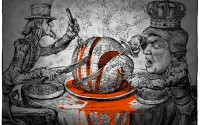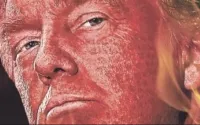25 July 2005Yahoo News
Telesur, the Latin American television network created by Venezuelan President Hugo Chavez to counter the "hegemony" of international networks like CNN, hit the airwaves for the first time.
The 24-hour network started broadcasting at 12:00 pm local time (16:00 GMT), kicking off with a ceremony in Caracas led by Chavez, who said his good friend Cuban president Fidel Castro was glued to his television for Telesur's debut.
"Telesur depends on no government, no line, it is free to pave the way toward integration," said Chavez, who sees the network as a means to foster regional unity in Latin America and the Caribbean.
Cuba's National Information Agency announced meanwhile that the Cuban bureau was up and running, with a signal launched from Simon Bolivar Plaza in the historic center of Havana.
Telesur pointedly made its first broadcasts on the annual commemoration of the birth of South American nationalist hero Bolivar, whom Chavez holds up as the model for his own "revolutionary government."
Venezuelan Minister of Information Andres Izarra said Telesur -- Television of the South -- seeks "a new international communications order" amid the "global onslaught of privatization and neoliberalism that threatens to destroy our cultures and civilizations."
"Telesur breaks into a space almost totally dominated by the oligarchies of our countries and their friends in the north, these groups have acted without answer for over 50 years, developing a brand of ideological colonialism or cultural imperialism," said Izarra, who is also Telesur's president.
The nascent network is already immersed in a war of words with Washington.
A member of the US House of Representatives has accused Chavez of launching "his own television network patterned after Al-Jazeera to spread his anti-American, anti-freedom rhetoric."
Connie Mack, a Republican representative from Florida, authored a bill last week which authorized the US to broadcast radio and television programmes at Venezuela which would counter Telesur's alleged anti-Americanism.
These broadcasts "will provide a consistently accurate, objective, and comprehensive source of news to Venezuela," Mack said.
"Hugo Chavez is an enemy of freedom and of those who support and promote it," Mack said when the bill was passed.
Chavez reacted sharply, saying he was ready to enter an "electronic war" and jam the transmissions from the United States in the same way Castro did when Washington set up Radio Marti in 1985.
Based in Caracas with 160 employees, Telesur will have correspondents in nine countries (Venezuela, Cuba, Argentina, Brazil, Bolivia, Colombia, Mexico and the United States) and will carry images from state and academic-related television stations across the region.
The company is capitalized with 10 million dollars, and is 51 percent controlled by Venezuela, 20 percent Argentina, 19 percent Cuba and 10 percent Uruguay.
Its advisory board, inaugurated Sunday, includes American actor Danny Glover, Le Monde Diplomatique editor Ignacio Ramonet and Argentine filmmaker Fernando Pino Solanas.
Even before its launch, the network had come under fire from critics who branded it Chavez' personal project, a "Tele-Chavez" to promote his own brand of "Bolivarian revolution."
Venezuelan officials have denied Telesur is an instrument of the government.
The network has also been criticized in neighboring Colombia for having included in its promotions, broadcast during a testing period, images of the Colombian anti-government guerilla leader Manuel Marulanda.
Chavez and Izarra have both rejected the criticism, saying Marulanda's image was only included among images of other people and events important in Latin American history.






